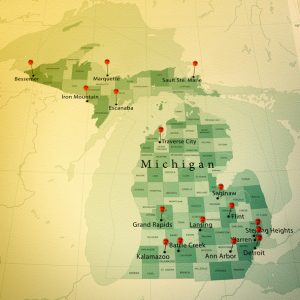 The U.S. Sixth Circuit Court of Appeals ruled this spring that chalking tires for parking enforcement violates the search and seizure clause of the Fourth Amendment. The decision had potential wide-reaching implications in the parking and mobility industry. IPMI developed this opinion piece on the matter.
The U.S. Sixth Circuit Court of Appeals ruled this spring that chalking tires for parking enforcement violates the search and seizure clause of the Fourth Amendment. The decision had potential wide-reaching implications in the parking and mobility industry. IPMI developed this opinion piece on the matter.
By Shawn Conrad, CAE
The federal Sixth Circuit Court of Appeals in Michigan recently issued a decision that, if it stands, could have major repercussions for cities across the United States. The court found that the act of “chalking” tires as part of a municipal parking enforcement program constitutes a warrantless search and, without a search warrant, is illegal under the Fourth Amendment.
Tire chalking is a common practice across the country. It’s done to monitor whether a vehicle remains parked in a given space longer than the permitted amount of time. While conducting rounds, a parking enforcement officer discretely places a chalk mark on vehicle tires. When the officer returns, generally several hours later, it is clear which vehicles have overstayed their parking session by the chalk marks on tires.
The court’s ruling may seem like an obscure one, but its implications are potentially far-reaching. Parking time limits are a vital element of downtown urban planning. It is essential to keep parking spaces turning over throughout the day, particularly in downtown business districts. The general rule of thumb is that cities want 15 percent of their spaces to be available on each block to ensure that people who need parking can find it quickly and safely. The more quickly and conveniently drivers can park, the faster they can get to the shops, restaurants, service providers and other businesses they intend to patronize.
The economic benefits of this type of downtown planning are easy to see. Businesses are more likely to thrive if their customers can find convenient parking close by. But there are other benefits as well. For example, when parking is available and easy to find, cars aren’t circling blocks waiting for parking spaces to become available. This reduces congestion and creates a much safer environment for pedestrians and other drivers. It also provides environmental benefits because cars aren’t unnecessarily burning fuel and emitting carbon monoxide. By supporting local businesses, reducing congestion, and promoting more sustainable urban planning, parking time limits dramatically promote the welfare of communities and improve the quality of life of citizens and employees of local businesses.
By every indication this issue isn’t settled yet. Higher courts may weigh in, and we hope they’ll consider the important role parking time limits play in downtown parking and transportation planning. The courts should recognize that chalking and other strategies designed to keep parking spaces turning over regularly aren’t infringements, but rather essential strategies for promoting economic welfare and improving the quality of life for citizens.
Cities must be able to place limits on how long parkers can remain in downtown spaces. It doesn’t matter whether cities chalk tires or use more sophisticated technologies like license plate recognition. It is vitally important for cities to be able to monitor lengths of stay. Ultimately, everyone—drivers, residents, and local businesses—benefits greatly when parking laws are enforced.
Shawn Conrad, CAE, is IPMI’s CEO.
 E-scooters and e-bikes will be able to operate on bike paths and sidewalks just like regular bicycles while respecting pedestrians just as regular bikes must in Ann Arbor, Mich., whose City Council gave unanimous preliminary approval to a personal mobility vehicle ordinance last week.
E-scooters and e-bikes will be able to operate on bike paths and sidewalks just like regular bicycles while respecting pedestrians just as regular bikes must in Ann Arbor, Mich., whose City Council gave unanimous preliminary approval to a personal mobility vehicle ordinance last week.


 Michigan Governor Gretchen Whitmer yesterday announced the establishment of dedicated lanes for autonomous vehicles (AVs) on a 40-mile stretch of highway between Detroit and Ann Arbor. The lanes will be built thanks to a private-public partnership (P3) and construction is expected to begin after a two-year study to determine the best strategy.
Michigan Governor Gretchen Whitmer yesterday announced the establishment of dedicated lanes for autonomous vehicles (AVs) on a 40-mile stretch of highway between Detroit and Ann Arbor. The lanes will be built thanks to a private-public partnership (P3) and construction is expected to begin after a two-year study to determine the best strategy.
 The
The  Lots is changing in the way people get from place to place, and today Forbes says the state of Michigan is at the leading edge of it all.
Lots is changing in the way people get from place to place, and today Forbes says the state of Michigan is at the leading edge of it all.